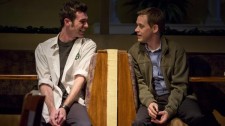“Pocatello”: My FT Review
 The Financial Times has posted my review: ‘Give credit to Playwrights Horizons: in the midst of the holiday season, with joy blaring relentlessly from every shop and doorway, this invaluable off-Broadway theatre presents a play in which the sound system is cracked, the music is bland rock and country, and the message is almost unrelieved despair. Welcome to “Pocatello,” Samuel D. Hunter’s well-constructed yet dispiriting study of 10 people struggling with life’s basics. Their anxieties are not small ones. Eddie, given a sensitive portrayal by T.R. Knight, manages an Italian-themed restaurant in Pocatello, Idaho, where this 100-minute evening, directed by Davis McCallum, takes place. Corporate powers-that-be have decided to shutter the emporium, and Eddie has not yet mustered the resolve to inform his employees.
The Financial Times has posted my review: ‘Give credit to Playwrights Horizons: in the midst of the holiday season, with joy blaring relentlessly from every shop and doorway, this invaluable off-Broadway theatre presents a play in which the sound system is cracked, the music is bland rock and country, and the message is almost unrelieved despair. Welcome to “Pocatello,” Samuel D. Hunter’s well-constructed yet dispiriting study of 10 people struggling with life’s basics. Their anxieties are not small ones. Eddie, given a sensitive portrayal by T.R. Knight, manages an Italian-themed restaurant in Pocatello, Idaho, where this 100-minute evening, directed by Davis McCallum, takes place. Corporate powers-that-be have decided to shutter the emporium, and Eddie has not yet mustered the resolve to inform his employees.
Those workers are a motley crew. Max is a convicted felon who can’t quite kick a meth habit; Isabelle, the only nearly sane character, goes with the flow; Troy, whose father suffers from dementia, battles with his wife, Tammy; and Becky, their 17-year-old daughter, can barely eat for fear of the pesticides and brutal slaughtering practices.
In his previous, acclaimed play, “The Whale,” Hunter created a central character who weighed more than 500 pounds but whose despair was touching in its extremity. In Pocatello, Eddie elicits less empathy. His father died when he was 13 and his mother, Doris, and older brother, Nick, are mini-monsters of self-absorption. But Eddie’s indecisiveness and willingness to be pushed around make him more annoying than affecting.
Eddie’s family has been in “Pocatello” for many generations. He stays in his dead-end town out of a desire to stay true to his roots and out of a yearning for long-lost family cohesion. Hunter’s larger theme — that brands such as Walmart and Starbucks have sapped the soul out of cities — is powerful yet has been well tilled by American writers for decades.
What makes “Pocatello” reasonably compelling are the actors — Leah Karpel is a grimly humorous Becky and Cameron Scoggins a charmingly hopped-up Max — and the skill with which Hunter weaves so many wounded souls in and out of the story.
